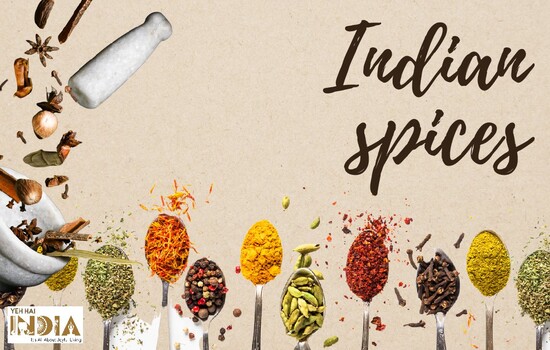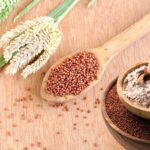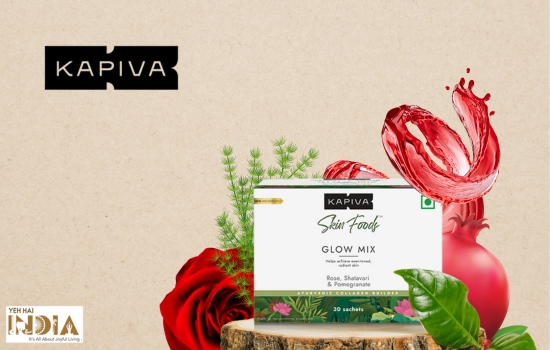Hailed all over the world as an essential cooking ingredient, Indian spices hold the secret to good health due to their immense medicinal value. Ancient India has contributed a lot to the new world. Some of the examples include Ayurveda, Astronomy, Astrology, etc. The same can be said about Indian spices. Every Indian spice that is used to whip up a delightful meal has an inherent health benefit associated with it, which has been documented in many traditional manuscripts.
These taste masters have been sitting in our kitchen in a nice square or round box, ready to be used. Not only the spices but this box also has its unknown, ancestral secret!
This little secret is not just compact but greatly nutritional too. This dual benefit courtesy goes to our ancestors for smartly giving us the taste masters, and on the other hand, making sure that we adhere to the right proportion and quantities so that we can have the fullest health benefits.
These mini-health doses of Indian spices have been the heroes behind the curtain, providing us with nutritional benefits and also tickling our taste buds.
Some of the popular Indian spices packed with a bunch of health benefits are as follows:
1. Turmeric

Turmeric, also known as Haldi, is the most versatile of all Indian spices. It is a panacea in traditional Indian cooking. Turmeric belongs to the ginger family and is cultivated in many countries around the globe. For instance, Madagascar, Indonesia, China, Thailand, Peru, and India, etc.
India is the largest producer, exporter and consumer of this magical spice. One of the main reasons for this is the large amounts of curcumin found in turmeric grown in India.
This spice of Asian cuisine has a pile of health benefits which include prevention against heart diseases, management of diabetes by increasing insensitivity, and weight loss. It also provides a great deal of pain relief in arthritis patients due to its anti-inflammatory properties and overall improving the arthritis status. Turmeric has been an essential ingredient to treat ailments, wounds, and infections as well as it has anti-cancer effects in terms of prevention as well as supporting cancer cell death.
This wonder spice is also anti-asthmatic, anti-viral, anti-fungal and immune boosting. With the plethora of physical health benefits, turmeric works also on improving mental health status with increased memory performance and reduced anger, confusion, fatigue, tension, and total mood disturbance.
Besides being beneficial to health, turmeric also infuses a beautiful colour and flavour into traditional dishes.
Recommended Story – 20 Plant-Based Proteins – The 20th on the list will surprise you
2. Red Chilli Powder
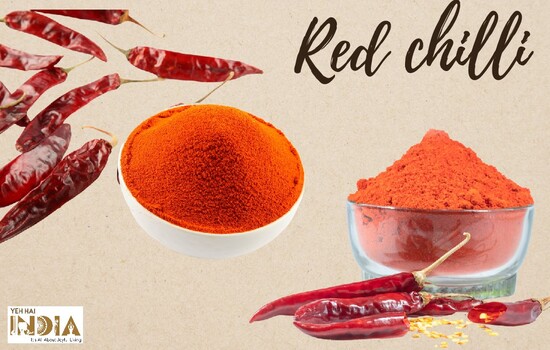
Chillies were first introduced in Goa by the Portuguese. It then slowly expanded in the South and then spread towards the North. Chilli peppers are also a rich source of vitamins and minerals but are often supposed to be consumed in limited quantities according to Ayurveda due to their contribution towards increasing the Pitta dosha.
Red chilli is known for containing capsaicin, which is a compound that helps burn fat and increase metabolism. Capsaicin is also effective in dealing with food cravings and tiredness.
Red chilli potentially helps to reduce blood cholesterol, preventing clot formation and regular consumption lowers the blood pressure. With the benefits listed, red chillies contain high amounts of vitamin A, making it an immunity-boosting and anti-infection spice helping to tackle nasal congestion. Regular addition of chilli helps in dropping insulin requirements and lowering sugar levels.
This capsaicin herb has been blamed for causing gastric ulcers and acting as an irritant, however, this very capsaicin in chillies prevents H.Pylori stomach infections (among the main causes of infection), rather than causing acid production, it inhibits the secretion if consumed in proper amounts.
With the other benefits, Red chilli powder is mainly used in every Indian household to lend warmth and colour to the dishes. It also gives a rich spicy flavour and zing to the food making it aromatic, lively and flavorful.
3. Coriander
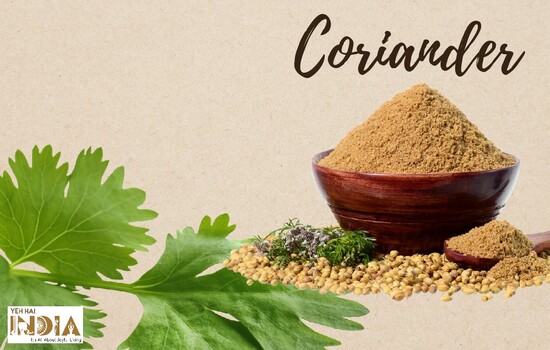
Coriander (Dhaniya) also known as cilantro is cultivated in many states of India including Rajasthan, Uttar Pradesh, Gujarat, Madhya Pradesh, and Tamil Nadu. This Indian spice is the most powerful and beneficial spice to exist and is used all over the world, usually available in fresh, dried, powdered and also in seeds form. Coriander holds healing qualities, however, there’s a way to use it as a medicine.
According to Ayurveda, coriander is Tridosha-Nashak, meaning it is good for all three doshas (Vatta, Pitta, Kapha) but is not to be consumed beyond a certain limit.
This spice is a herbal remedy because of its antioxidant, anti-inflammatory, analgesic and antimicrobial properties. From seeds to relieve pain, escalating digestion, rheumatoid arthritis and inflammation, to oil for anti-microbial properties and gastric ulcers, to decoction for treating mouth ulcers and eye redness, coriander works in all forms as a charm.
While considering it as a whole, it helps in lowering cholesterol, reducing blood pressure and fasting sugar levels with properties such as antifungal, hepatoprotective, diuretic, appetite enhancing, sedative and cooling.
4. Cloves
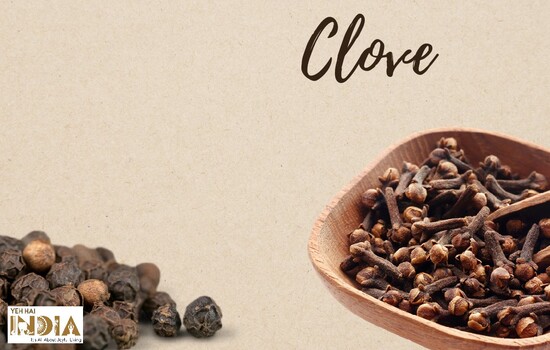
Cloves were first introduced in India during the 1800s and are one of the four major spices, the others being peppers, nutmeg and cinnamon. It adds an immaculate flavour and also holds vast medicinal value.
Clove is an excellent element to maintain glowing, smooth skin. Moreover, its buds are fragrant and help in getting rid of bad breath. As per Ayurveda, it is believed that cloves are effective for improving metabolism, circulation, digestion and dealing with bloating, nausea and digestive disorders.
Cloves also relieve muscle spasm, work as a kidney tonic and eases coughing. While clove oil acts as an anaesthetic, anti-inflammatory and cooling agent.
Most oral hygiene products use clove oil as a key ingredient to promote dental health and prevent bad breath. Cloves add a strong spicy flavour to any dish and balance the sweetness due to their natural bitterness and astringency.
5. Cardamom
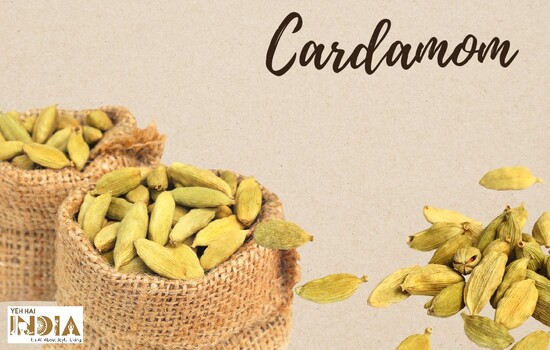
Cardamom also known as Elaichi, typically the ‘Queen of Spices’ is the flavour bomb that soothes every time we have a spoonful of kheer or explodes when we have biryani. It helps enhance the aroma of traditional Indian dishes and gives a delightful flavour to them. This exquisite Indian spice was first got cultivated in the southern parts of the peninsula.
According to Ayurveda, cardamom is a tridoshik spice which helps in balancing the three doshas (Vatta, Pitta, Kapha).
This soothing-exploding flavour bomb is not just a taste condiment but a medicinal spice too. For ages, cardamom has been a digestive aid and a mouth freshener.
But, now expanding its work of action, research shows that these seeds also relieve bronchitis, depression, gallbladder problems, dysentery, influenza, infections, and impotence. Cardamom has also been seen to reduce blood pressure levels, reduce stress, easing breathing.
This queen indeed also works on beautifying by preventing skin-related problems such as acne, breakouts, and blemishes. Chewing these seeds helps in the detoxification of the body, which indirectly helps in clearer skin.
6. Cumin Seeds
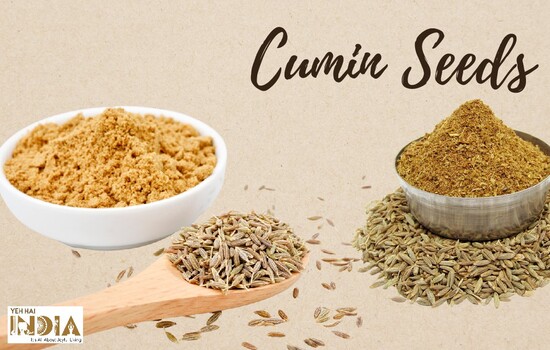
Cumin seeds, popularly known as Jeera are used in most Indian dishes along with a combination of other spices. This spice has a distinctive aroma and is a famous summer drink (Jaljeera). Cumin is used as a seed as well as an essential oil.
The famous jal jeera is used as an appetizer for a reason, cumin works as a digestive stimulant by stimulating digestive enzyme secretion, boosting the liver’s ability to detoxify, eliminating gas and settling an upset stomach.
Jeera is also a great solution to loosening up mucus and phlegm in the respiratory tracts and makes it easy to eliminate and also helps in controlling any sort of inflammation caused due to allergies. It also helps in the overall upliftment of your immune system. Jeera water is an amazing remedy to decrease blood sugar levels and helps in weight reduction.
While cumin works the major problems, it is also used in healing cuts and wounds, being rich in iron, it is an important nutritional additive for anaemic people. It also helps in increasing milk secretion and lactation in breastfeeding mothers.
As essential oils in cumin seeds have a calming effect, thus are very helpful in battling with severe anxiety, depression and insomnia. The seed oil also acts as a disinfectant and thus has its uses in cosmetology for skin care.
7. Fenugreek seeds
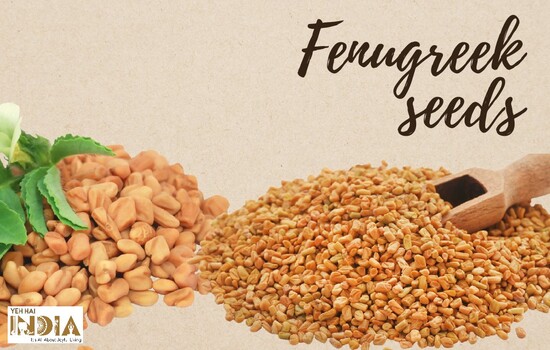
Fenugreek seeds or Methi seeds are a great Ayurvedic remedy available in every Indian household. Methi seeds help to restrain diabetes and maintain cholesterol and blood pressure.
They also are a scalp cleanser and very helpful to treat acne. While the fibre content in these helps in treating constipation. While this spice is well known for diabetes, fenugreek has been a galactagogue (foods which help in increasing milk production during breastfeeding) from ancient times.
Research shows that there was an increase in the milk volume as well as infant weight, due to fenugreek consumption during breastfeeding.
According to Ayurveda, people with Vatta and Kapha constitutions can benefit a lot from this spice as they need additional heat in their bodies to have good health.
8. Dry Ginger
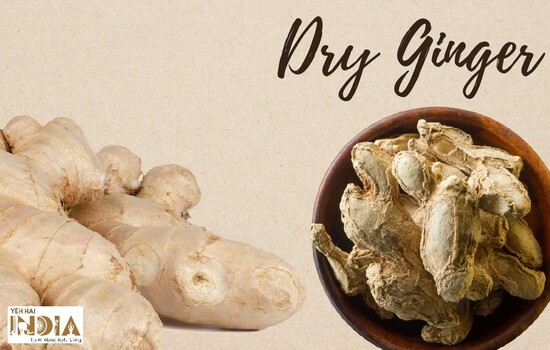
Dry Ginger also known as Saunth is an exceptional spice helping to aid digestion, triggering weight loss, curing headaches, etc. Ginger has always been one of the key ingredients in Ayurveda and traditional Indian cooking.
Saunth is usually taken in the form of Churan or Kadha. Moreover, it is both antibacterial and anti-inflammatory. Hence, natural medicine for seasonal colds and coughs.
Ginger powder helps reduce morning sickness, and nausea and compared to fresh ginger has higher antioxidant properties. It is also used to reduce stomach irritation and soothes arthritis.
9. Amchur
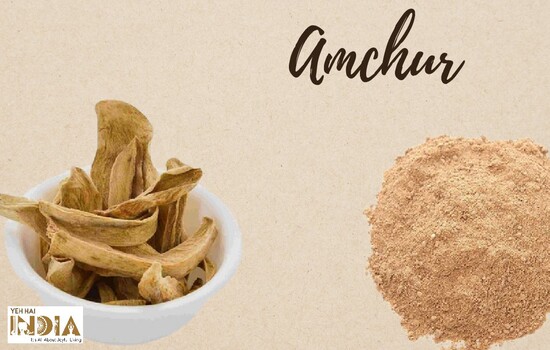
Amchur is Dry Mango powder. Mangoes being a seasonal fruit are always consumed in a fresh form. However, people have come up with innovative ways to consume this treat throughout the year.
Some of these ways are to freeze them and use the peel when needed to make Aamras, to make pickles and store them, and to powder them and make Amchur. Amchur is used in various dishes and is often used as a seasoner just like lemon juice or lime.
It enhances bowel movements, fights constipation and boosts digestion. Regular consumption of Amchur also ensures overall maintenance of your digestive tract and health. It is also low in carbohydrates which makes it ideal to add to weight loss programs.
Using amchur in your food also helps in gaining clarity in your vision and prevents eye disorders or cataracts. This spice is a powerhouse of vitamin C and will always protect you from life-threatening diseases like cancer.
Recommended Story – How To Make Turmeric Milk And Its Benefits For Health
10. Black Pepper
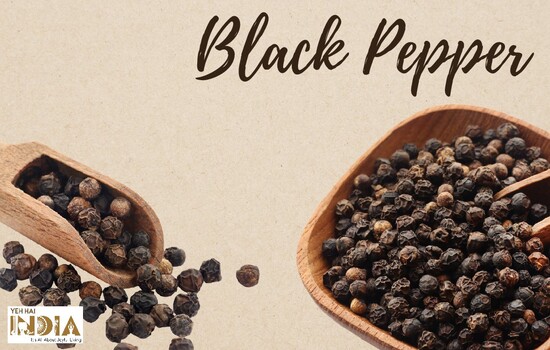
Black pepper, also known as the king of all spices, is an all-rounder. This spice is a bit pungent to taste and lighter to digest. Black pepper is one of the three important ingredients in the Ayurvedic medicine Trikatu.
Being the king of spices, pepper provides king-size benefits such as faster breakdown of fat molecules, prevention from the accumulation of fat, and immunomodulation.
It also promotes the removal of toxins and heals and vitalizes the organs. It is also widely used as an antidote to insect bites and it helps battle intestinal worms, cardiovascular disease, lowers LDL and triglyceride levels and stimulates the perception of taste.
People suffering from Asthma and respiratory disorders can count on this wonderful spice for treatment. Black pepper due to its warming properties helps in improving digestive power as well as soothes inflammation.
In case of hair loss caused by scalp ringworm, black pepper onion and salt can be applied to treat it. The same can be used to cure headaches. Pepper is also used to deal with tooth pain.
11. Mustard Seeds
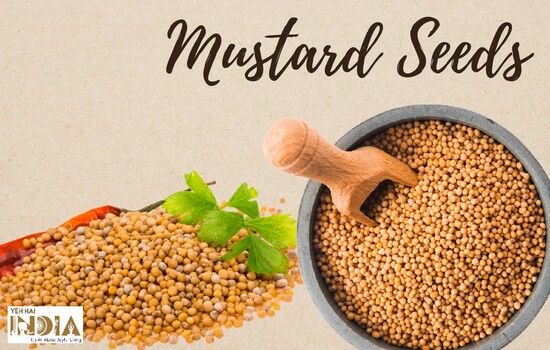
Mustard seeds, commonly known as Rai or Sarso are one of the most ancient Indian spices. This seed is of three different variants; black, white and yellow. Mustard is mainly appreciated and used for its relieving flatulence and odour.
This ingredient is a must in most of the masalas, Sambar powder and even pickles. Mustard seeds also include a significant element called Rutin. This element is usually added to Vitamin C capsules to increase their impact.
A compound called Arabinogalactan is also found in these powerful seeds, which is proven to be beneficial to get rid of infections and liver protection.
Due to its antioxidant and antifungal properties, these are used as a natural scrub to hydrate the skin and fight off fungal infections. This powerhouse helps in relieving spasms in the form of oil and promotes healthy hair growth and prevents hair loss.
12. Nutmeg

Nutmeg is widely known as Jaiphal. It is a seed that is usually ground and made in a powder form, which is then used as a spice. The outer skin of the seeds is commonly known as Mace or Javitri and is also used as a spice. This culinary spice is added to various sweets as it has a relaxing effect on the body and helps in inducing the sleep cycle.
For centuries, nutmeg has been used for babies to get relief from diarrhoea and gas as it promotes digestion.
Due to its absorbing qualities, nutmeg works wonders in clearing throat, asthma, and cough. It is known as a cardiac tonic. Nutmeg is also used to maintain healthy sexual health. Among the various benefits, nutmeg contains myrislignan, which has a protective effect on the liver.
With physical health, nutmeg also has benefits for mental health, as it has neuroprotective properties.
13. Asafoetida
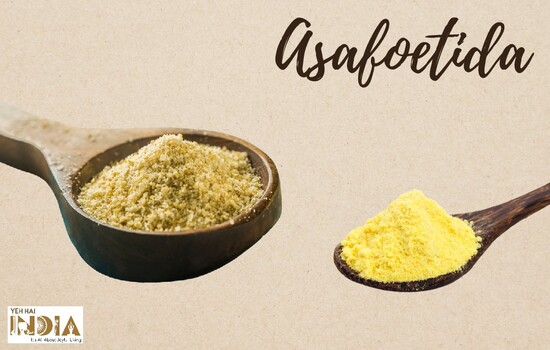
Asafoetida or Hing is one of the most commonly used Indian spices in almost all Indian dishes. The name Hing in Sanskrit, means effective in a thousand ways.
Hing is used to treat gastrointestinal problems and is an effective treatment for flatulence, while as per Ayurveda it also helps in reducing bloating and restoring normal moments of the Vatta and Kapha. It is also very good for the heart. High blood pressure patients can benefit a lot from this spice.
14. Bay Leaf
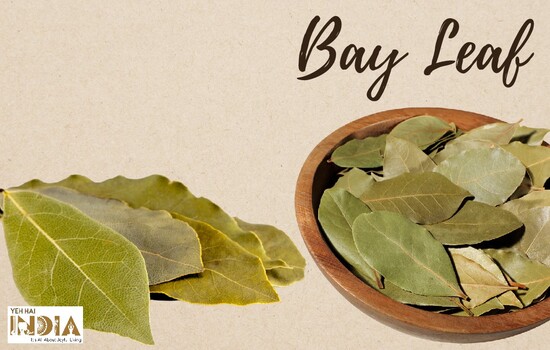
Bay leaf is commonly known as Tej Patta. Tej patta is often used for its aroma and for infusing a mint-like flavour in dishes that predominantly have a gravy base to them.
Bay leaves are a good source of both Vitamin A and C. Patients suffering from diabetes can benefit from the consumption of this spice for it helps maintain blood glucose levels and secreting insulin due to its anti-inflammatory and antioxidant properties.
Tej patta is also excellent for getting rid of excess sodium and bad cholesterol in the body and hence, is good for the heart and managing blood pressure. In case of stomach ulcers, tej patta lessens the free radical damage created in the stomach cells due to it being gastroprotective.
Tej patta is also a carminative and is therefore a great addition to food if you want to stay away from bloating caused due to indigestion and accumulation of fluids in the body.
With physical health, regular consumption of bay leaves in the form of tea can help regulate metabolism, enzyme synthesis and nervous system function.
15. Ajwain
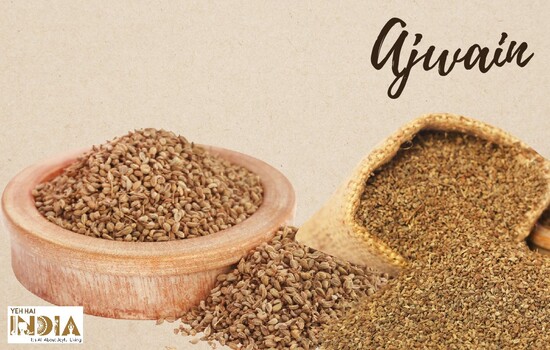
Ajwain (Bishop’s weed) also known as carom seeds is a very popular spice in every Indian household. It prevents toxins from forming in the digestive canal. Ajwain also restricts malabsorption and indigestion, cures flatulence and works magic against constipation.
It is also a great source of nutrients such as fibre, minerals, antioxidants and vitamins. They’re used in a variety of Ayurvedic medicines to treat various conditions such as mental disorders, respiratory problems and digestive problems.
Also, it helps improve one’s appetite. While seeds include Thymol and Carvacrol, both compounds make Ajwain antifungal and antibacterial.
To conclude, all these sacred spices have been around for ages and are a powerful amalgamation of health benefits. Spices are the heart of every Indian household and make every dish relishing, unique and healthy. Due to their health-beneficial properties, having spices is like having a pharmacy in your kitchen.
With such a vast list of benefits, including spices in your everyday cooking can help you stay healthy and lead a disease-free life.
Also Read – Indian Spices to Boost your Immunity during Pandemic


